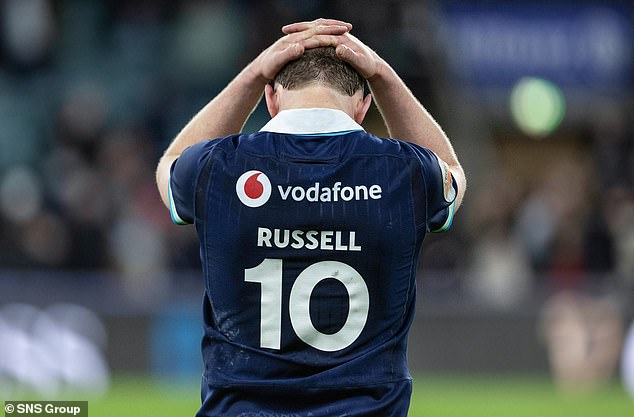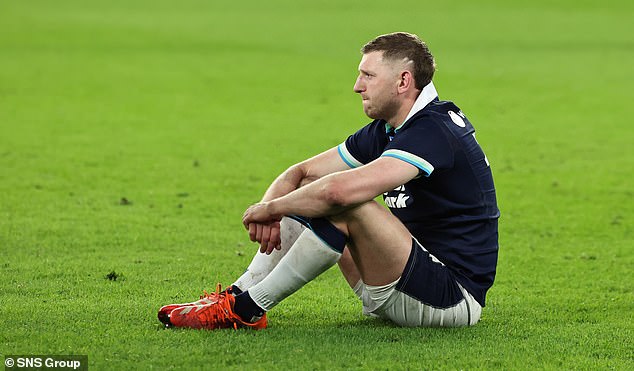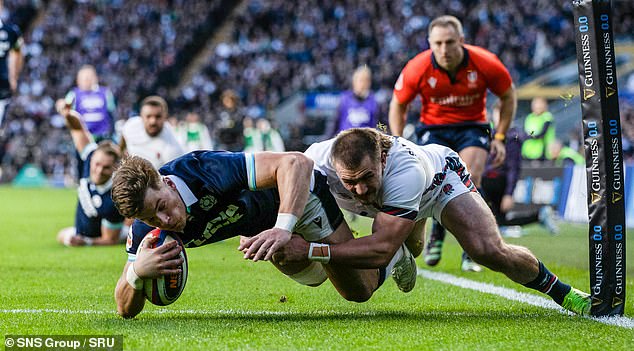
[ad_1]
The dividing line between success and failure can often be reduced to the most slender of margins.
Had Finn Russell knocked his last-minute conversion attempt a mere 10 feet or so further to the right on Saturday evening, the entire narrative around this Scotland team would look and feel entirely different.
It would be they, not England, who would now be looking forward to their final two Six Nations matches. It would be they who would now be in with a chance of clinching the championship after retaining their grip on the Calcutta Cup.
When Russell missed off the tee for the third time in the match, the picture changed dramatically. It is results and not performances that dictate a team’s fortunes, a player’s legacy and a head coach’s future.
In the aftermath of another painful loss, it was hard to summon much in the way of optimism with Scotland out of the title reckoning for another year.
That is the cruel nature of sport. Sometimes the better team doesn’t win. Impressive individual performances can get overlooked. Positive moments forgotten about. The immediate analysis instead focuses on where it went wrong. Where it went right is usually relegated to an afterthought in the rush to make sense of an illogical outcome.

Finn Russell has his head in his hands after Scotland suffered their narrow defeat by England

Russell would have transformed the entire narrative had he scored with his last-gasp kick

Huw Jones’ try-scoring performance was one of several positives for Scotland at Twickenham
Few in that situation can rationalise and compartmentalise their thoughts better than Gregor Townsend. The Scotland head coach has a remarkable, almost programmed, ability to exclude the emotive in any post-match summarising.
Townsend can absorb the heartbreaking pain induced by a one-point loss to his greatest rivals and produce clinical, forensic analysis of how he viewed the contest, concentrating primarily on the areas where he believed his team performed well.
By his own admission, he has not always been like this. During his playing days, Townsend was driven more by instinct and emotion, prone to rash decisions.
Now he is a considerably calmer, process-driven figure, one who can endure 80 minutes of frenetic, frenzied Calcutta Cup action and somehow break it down almost instantly to provide a considered response.
That is an impressive skill but it can also be frustrating for supporters who would rather hear their leaders speak passionately from the heart, especially immediately after a fixture like this one that is inevitably dripping in drama and coated in controversy.
Quoting statistics that reflect positively on your team’s performance can also feel like a form of deflection after a poor result, a failure to take ownership of an inexplicable defeat when all signs were pointing towards a victory that never materialised.
It becomes increasingly difficult to make the case that progress is being made when that claim is not reflected in results or league position. Home wins over Italy and Wales — and the latter is no longer a given — would suggest this is a collective that is trending downwards rather than upwards.
Even so, there was still something to be gleaned from Townsend’s assertion that there remains plenty to be positive about following events at Twickenham, if only Scotland could harness those strengths on a more consistent basis.
Several players enhanced their reputations with eye-catching individual displays. Tom Jordan, Kyle Rowe and Stafford McDowall all showcased their attacking talents and demonstrated that they deserve to become regulars on the international stage.
Duhan van der Merwe and Huw Jones again excelled in this fixture, the former scoring his seventh try against England from just five games and the pair both joining Stuart Hogg at the top of Scotland’s Six Nations try-scoring charts with 16.
There was another redemption tale for Jamie Ritchie, who again thrived on the big occasion, just as he did against Australia last autumn. It has been a tough few years for the former Scotland captain, who has been rotated regularly in and out of the back row, but here was fresh evidence that there are few better at the breakdown.
His performance suggested that a place in this year’s British and Irish Lions squad needn’t be beyond him. Others like Van der Merwe and Jones — and perhaps also Jordan — deserve at least to be in the conversation, too.
Scotland’s commitment to playing fast, attacking rugby continues to win them fresh admirers, in contrast to England’s attritional, box-kicking approach.
That the hosts somehow carved out a one-point win for the second Six Nations match in succession can be put down more to Scottish sloppiness and French fallibility, rather than anything particularly inspirational being produced by Steve Borthwick’s side.
As winners, though, they have earned the right to avoid scrutiny and bask in their success. If Russell had made even one of those kicks, that would have been Scotland’s luxury instead.
[ad_2]
Copyright for syndicated content belongs to the linked Source link

